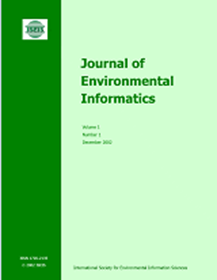Assessing Human Health Risk to DNAPLs Exposure in Bayesian Uncertainty Analysis
IF 5.4
1区 环境科学与生态学
Q1 ENVIRONMENTAL SCIENCES
引用次数: 6
Abstract
The human health risk (HHR) assessment to dense non-aqueous phase liquids (DNAPLs) exposure has become an important part of groundwater environment management. Usually, DNAPL transport models are applied to simulate the concentration distribution of contaminant for HHR assessment. The present paper studied the influences of model uncertainties on the HHR assessment, and the metric of Incremental Lifetime Cancer Risk (ILCR) was used to quantify HHR. The impacts of permeability’s heterogeneity and the structure of DNAPL transport model (e.g., the constitutive model) on HHR assessment were evaluated based on a synthetical DNAPL transport model. The results demonstrate that, compared with the low heterogeneity, the high heterogeneity leads to lower average ILCR value at the control planes near the source zone, and higher average ILCR value at the control planes far away from the source zone. In addition, the HHR assessments would be inconsistent for the two constitutive models, i.e., Stone-Parker (S-P) and Coreyvan Genuchten (C-v) models. Compared with the HHR assessment depending on C-v model, the mean of ILCR’s probability distribution produced by S-P model is larger at the control planes near the source zone, and smaller at the control planes far away from the source zone. Moreover, based on a sandbox experiment, the impact of parameter uncertainty of DNAPL transport model on HHR assessment was evaluated by Markov chain Monte Carlo (MCMC) simulation. The results show that it is infeasible and risky to assess HHR by the specific parameters of contaminant transport model and ignoring parameter uncertainty. The HHR assessment by incorporating Bayesian uncertainty analysis could provide more flexible information. In addition, the sparse grid (SG) surrogate is an effective way to reduce computation burden caused by the larger number of model executions in the MCMC based HHR assessment.在贝叶斯不确定性分析中评估暴露于DNAPLs的人类健康风险
致密非水相液体(DNAPLs)暴露对人体健康的风险评价已成为地下水环境管理的重要内容。在HHR评价中,通常采用DNAPL输运模型来模拟污染物的浓度分布。本文研究了模型不确定性对HHR评估的影响,并采用终生癌症风险增量(ILCR)指标对HHR进行量化。基于综合DNAPL输运模型,评价了渗透率非均质性和DNAPL输运模型结构(即本构模型)对HHR评价的影响。结果表明,与低非均质性相比,高非均质性导致源区附近控制平面的平均ILCR值较低,而远离源区的控制平面的平均ILCR值较高。此外,Stone-Parker (S-P)和Coreyvan Genuchten (C-v)两种构成模型的人类健康风险评估结果也不一致。与基于C-v模型的HHR评估相比,S-P模型产生的ILCR概率分布均值在源区附近的控制平面较大,而在远离源区的控制平面较小。此外,在沙盒试验的基础上,采用马尔可夫链蒙特卡罗(MCMC)模拟方法,评估了DNAPL输运模型参数不确定性对HHR评价的影响。结果表明,仅通过污染物输运模型的具体参数而忽略参数的不确定性来评估HHR是不可行的,也是有风险的。结合贝叶斯不确定性分析的HHR评估可以提供更灵活的信息。此外,在基于MCMC的HHR评估中,稀疏网格(SG)代理是一种有效的方法,可以减少由于模型执行次数过多而造成的计算负担。
本文章由计算机程序翻译,如有差异,请以英文原文为准。
求助全文
约1分钟内获得全文
求助全文
来源期刊

Journal of Environmental Informatics
ENVIRONMENTAL SCIENCES-
CiteScore
12.40
自引率
2.90%
发文量
7
审稿时长
24 months
期刊介绍:
Journal of Environmental Informatics (JEI) is an international, peer-reviewed, and interdisciplinary publication designed to foster research innovation and discovery on basic science and information technology for addressing various environmental problems. The journal aims to motivate and enhance the integration of science and technology to help develop sustainable solutions that are consensus-oriented, risk-informed, scientifically-based and cost-effective. JEI serves researchers, educators and practitioners who are interested in theoretical and/or applied aspects of environmental science, regardless of disciplinary boundaries. The topics addressed by the journal include:
- Planning of energy, environmental and ecological management systems
- Simulation, optimization and Environmental decision support
- Environmental geomatics - GIS, RS and other spatial information technologies
- Informatics for environmental chemistry and biochemistry
- Environmental applications of functional materials
- Environmental phenomena at atomic, molecular and macromolecular scales
- Modeling of chemical, biological and environmental processes
- Modeling of biotechnological systems for enhanced pollution mitigation
- Computer graphics and visualization for environmental decision support
- Artificial intelligence and expert systems for environmental applications
- Environmental statistics and risk analysis
- Climate modeling, downscaling, impact assessment, and adaptation planning
- Other areas of environmental systems science and information technology.
 求助内容:
求助内容: 应助结果提醒方式:
应助结果提醒方式:


